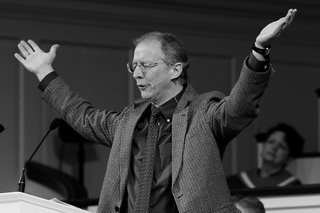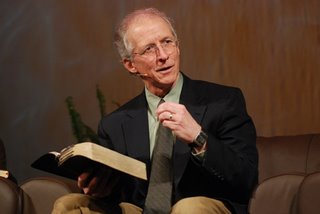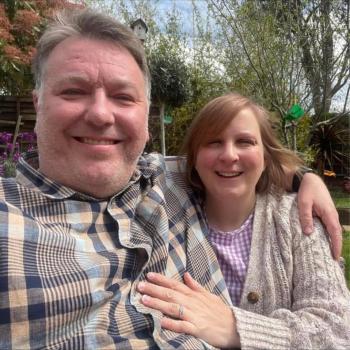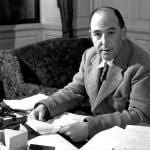Yesterday, in the second part of my interview with John Piper, he talked about passionate preaching. Today, John talks about prayer and Bible study, and in particular, his personal “rhythm” for this important discipline. The video of this part of the interview can be seen here.
*************************
Adrian
So, what you’ve described — I suspect there may be many preachers out there saying, “Okay, I get what you’re saying, but how do I get to that place?” You mentioned prayer. I know prayer is important to you. You often talk about prayer in your books. Could you talk a little bit about what your own prayer life looks like? How you get, if you like, connected to God in that way you’re describing?
John
I’ll try without disobeying the Lord’s injunction in the Sermon on the Mount to go into your closet . . .
Adrian
Yeah . . .
John
I surely am not a model to hold up for prayer because I have models and I fall short of them. But, my life is a combination of private prayer, family prayer, corporate prayer at church—it’s a rhythm of those things. I try to be with the Lord every morning for an hour or so. The way it works for me is mingling together Word and prayer. I don’t read the Bible for twenty minutes and pray for twenty minutes, or forty and forty, whatever. It’s in and out and in and out. I learned that basically from George Mueller, who said he made the big mistake in his early Christian life of trying to pray for an extended period of time, and his mind inevitably went everywhere except toward the Lord, so he began by whispering up a one minute prayer for help, and then he took the Word and turned everything he’d read into prayer. He said I laid sixty things before the Lord this morning, and I laid them through the Word. And that’s pretty much the way I go about it.
 When it comes to praying for things, besides what’s in the text, I pray in concentric circles. The most needy person I know is me. Therefore I pray about me first, because if I can’t be fixed, I won’t fix anybody. I won’t bless my wife or children or the Church. So I pray about this soul and my passion for God here, and then I move out to my wife and my children. I pray for them about whatever was in the text. Then I move out to my elders and my staff, and I name all the staff every day and our elders. And then I move out to the church, and move out to the city, and the nations. That’s the way I pray. And that can fill up a lot of time as God brings different things. I use helps. I have lists. I have lists of the names because I can’t even remember the names of 34 elders sometimes, and I have to say those. And then I use things like Operation World to pray for the nations. I keep it on my computer. I keep it in the book beside my old prayer bench at home.
When it comes to praying for things, besides what’s in the text, I pray in concentric circles. The most needy person I know is me. Therefore I pray about me first, because if I can’t be fixed, I won’t fix anybody. I won’t bless my wife or children or the Church. So I pray about this soul and my passion for God here, and then I move out to my wife and my children. I pray for them about whatever was in the text. Then I move out to my elders and my staff, and I name all the staff every day and our elders. And then I move out to the church, and move out to the city, and the nations. That’s the way I pray. And that can fill up a lot of time as God brings different things. I use helps. I have lists. I have lists of the names because I can’t even remember the names of 34 elders sometimes, and I have to say those. And then I use things like Operation World to pray for the nations. I keep it on my computer. I keep it in the book beside my old prayer bench at home.
By the way, I have a place of prayer. In my study there’s a little corner with a built wall, like this—it’s got a bench, it’s got books, it’s got a Bible. So I can kneel, it’s got a little rug. In 1975, so it’s now thirty-two years ago, I realized when I finished graduate school and owned my first home that this home should have a prayer place in it because otherwise, I think if you don’t have a place that’s designated that’s relatively secure, you tend to kind of sit on the couch, cross your legs, put some coffee beside you, and go to sleep, and call it prayer time. You don’t tend to do that if you have a place that’s just set aside for prayer.
Then there’s the family—my wife and I and my daughter—pray and have devotions in the morning. And then we do it in the evening. And then my wife and I pray before we go to bed at night, and read a little devotional called “Daily Life.” So that’s the rhythm—morning, evening, wife.
And then there are eight prayer meetings at our church, and I go to four of them plus the staff prayer meeting. They are thirty minute prayer meetings. That’s all they all. We don’t talk at all. We just sit down—bang! We start praying, and bang! Thirty minutes later we stop and go our separate ways. It’s very . . . and that way they last. I’ve been to one of these prayer meetings for probably over twenty years. The Friday morning 6:30 prayer meeting has been going on for twenty years and I hardly ever miss it, except when I’m on vacation, and there’s absolutely zero conversation, zero nonsense. It’s just you’re there; it’s 6:30, let us pray! It’s 7:00—bang! We’re done! Everybody disappears. And it’s really precious! It’s powerful!
So, those are my rhythms, personal, family, corporate, and lots of others sprinkled in. Paul said, “Pray without ceasing,” so I’m always crying for help. So, “Right now, Lord, help me in this interview!”
Adrian
(Laughing) Yeah! You and me both! So, you pray. Obviously you study the Word. And I suspect most of what you do is fairly standard on that. But do you have any particular hints about how to study the Bible that would help people maybe?
John
H-m-m-m. I’m not a good example there either. My life has kind of been taken out of my control in the last years. I feel like I’m governed by what other people want from me, pretty much, than what I want to do sometimes.
 A combination of three things, I would think, is what a pastor would want. One is general reading. And there—what can you say? There’s a billion things to read. You let your own heart and good recommenders, good bloggers, tell you what’s good. And then you don’t waste your time reading what’s bad. Somebody else better read it first. Don’t read it first. And probably you should read something that’s 200 years old, 300 years old, because the new stuff is here today and gone tomorrow by and large. So READING.
A combination of three things, I would think, is what a pastor would want. One is general reading. And there—what can you say? There’s a billion things to read. You let your own heart and good recommenders, good bloggers, tell you what’s good. And then you don’t waste your time reading what’s bad. Somebody else better read it first. Don’t read it first. And probably you should read something that’s 200 years old, 300 years old, because the new stuff is here today and gone tomorrow by and large. So READING.
Secondly, some more or less systematic way of growing in your knowledge of Scripture. The Bible says, “Grow in the knowledge of the grace of the Lord Jesus Christ,” so some regular reading and rigorous effort to broaden your understanding of the scope of Scripture.
The third is preparation for what you do. That’s where most of my effort is right now. I languish in the other two and I flourish here. I don’t begrudge myself that too much because what I have found (and this might be encouraging to any of the younger guys pondering what they’re going to do with their lives)—when I left academia—six years of teaching Bible college to do pastoral ministry, I thought, “I’m giving up all my summers (teachers have all their summers to study and write), I’m giving up a small amount of teaching and a large amount of writing opportunities—I’m giving that up for a life of pressure, and administration, and crises, and crunch, and just normal pastoral labors, so will I languish in my ability to see Scripture?”
preachers.htm”>part 4 . . .















